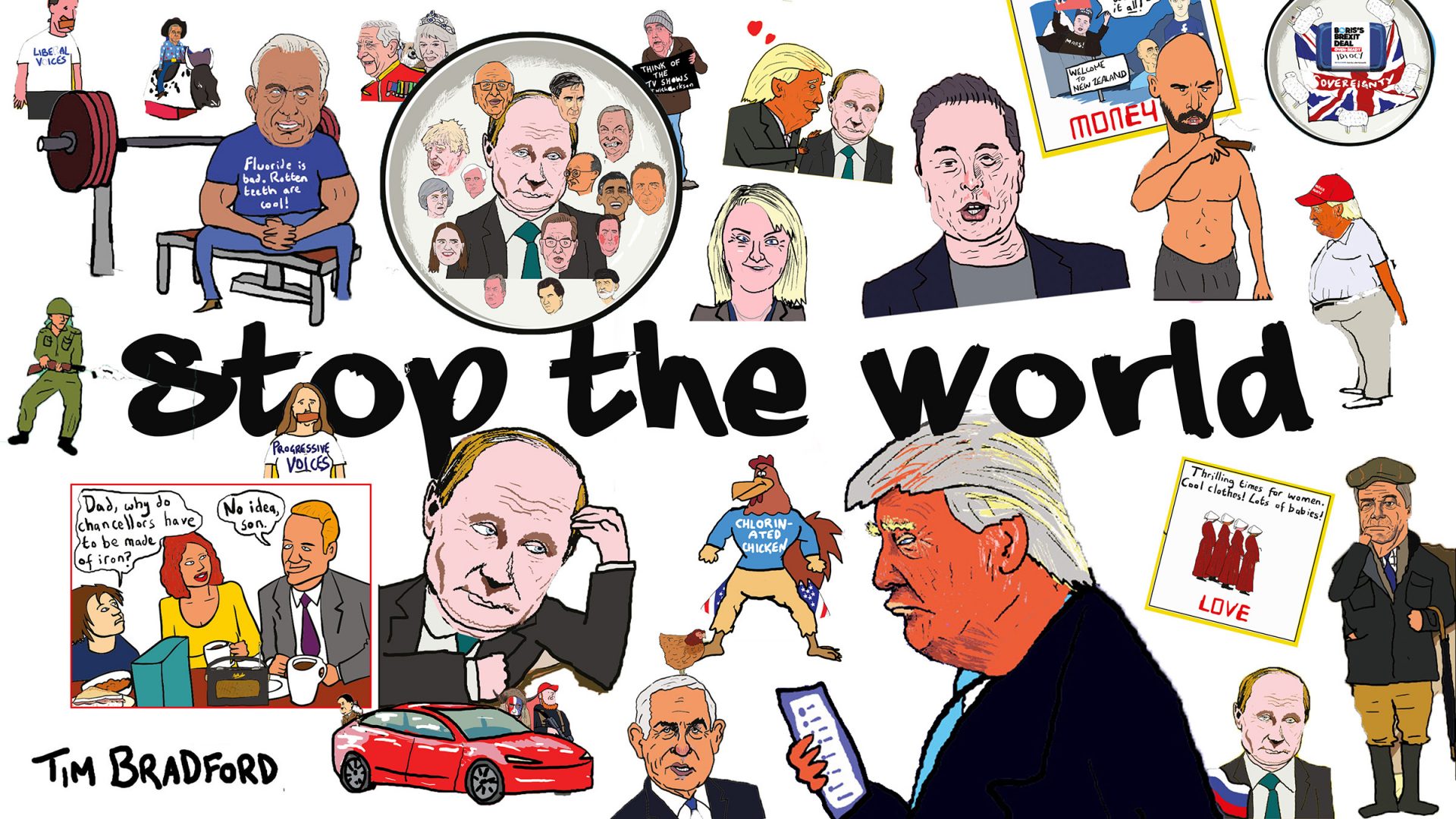As you may have heard, Keir Starmer has some regrets over how things have gone in the year since he entered Downing Street.
Judging by the reaction of various allies and at least one “senior government source”, his first anniversary interviews were probably less an expression of a fully thought-through media strategy than remarkably honest self-criticism from someone who wanted to get this stuff off his chest.
And, even though acknowledging mistakes may have helped clear the air – a bit – with disappointed voters and rebellious Labour MPs, it’s doubtful that will count for much unless the prime minister has also begun to clear a path towards better years ahead.
On this question, as so often before in his political career, commentators have herded into their customary consensus that he must now provide them with the kind of answer they think is the prerequisite for political leadership in this shrill and polarised social media age. William Hague demands in The Times that he set out a “big idea”, the Guardian’s Martin Kettle is calling once again for a “vision” while the editor of the New Statesman asks Starmer to accept that Britain needs to “fundamentally change in a kind of Thatcherite way”.
Well, they shouldn’t hold their breath. Starmer has always disliked words like “vision” and has never been interested in having an “-ism” or an “-ite” attached to his name. Instead, a more meaningful clue about the route this evidence-based prime minister may take towards political recovery can be found in an aspect of his performance, largely ignored by the scorecards published last week, where he has done better than expected.
On foreign policy, even political opponents credit the prime minister with being calm and sure-footed in the face of successive international crises. By understanding complexity and offering compromise, he has secured real achievements on the global stage that eluded his predecessors, while also managing to contain some of the mayhem being unleashed on the world by Donald Trump.
Back in November, the newly elected Conservative leader Kemi Badenoch declared “the return of President Trump is [a] golden opportunity” for Britain that she warned would be squandered by its EU-obsessed prime minister. But Starmer declined her invitation to make a choice between Europe and the US and, instead, got new trade agreements with both.
Starmer and Trump have very different personalities and politics, which means their relationship still has time to go wrong – but the president seems to have developed some respect for the prime minister, even suggesting that he might deserve the accolade of a fellow “deal-maker”.
The White House meeting on February 27, which paved the way for the UK to become the first country to secure a trade agreement with the US administration, meant stepping into a diplomatic cauldron. At the time, Trump was threatening to withdraw all support from Ukraine and possibly Nato, as well as wreck the global economy with tariffs. There was no point in going into that kind of meeting with a “vision” or a “big new idea”. It was about trying to get the best possible outcome from a very precarious situation.
The highlight came when the prime minister, with an uncustomary flourish, pulled out an envelope containing a handwritten letter from King Charles inviting the president for a second state visit. Minutes earlier, however, the scene had been a little less decorous. A British aide was holding tight to the royal invitation, having refused American demands for it to be submitted in advance. Starmer suddenly realised he would need to present the letter himself but was surrounded by White House staff preparing the president for the media.
I’m told that the envelope had to be gently lobbed over their heads to the prime minister who, if he ever wanted to do the show-off performative thing, could have boasted about having a reassuringly safe pair of hands.
Suggested Reading


After one year in office, here’s what Starmer needs to do now
There was a notable win that day in getting Trump’s support for the proposed handover of the Chagos Islands, under which Britain will continue leasing land from Mauritius for a UK-US military airbase. This was despite both the Tories and Nigel Farage – who claims to be a close friend of the president – opposing the plan. It was the sort of issue that might have vexed Starmer on the domestic front, and several of his political aides are understood to have been deeply worried, but he seems more confident in trusting his instincts on foreign policy.
Bending down to pick up the text of a trade deal that dropped from Trump’s file during a G7 summit in Canada last month wasn’t a “grovelling like a dog”, as one newspaper portrayed it, but simply the action of a decent and courteous prime minister towards a president who acts like he hasn’t picked up anything in his life.
Another illustration of Starmer’s straight-forward approach on foreign policy was over the appointment of Peter Mandelson as Britain’s ambassador to the US in December. He has generally been regarded as a success with his political skills and swagger adapting well to the narcissistic MAGA-land of Washington.
The new edition of my biography reveals that this was despite, just days beforehand, the name of George Osborne being added to the final shortlist presented to the prime minister by Downing Street advisers. They are understood to have invested considerable effort in unsuccessfully pushing the former Tory chancellor’s application, even though that perhaps unnecessarily complicated what Starmer would ultimately regard as a relatively simple decision.
Much of his foreign policy can be characterised as a similarly hard-headed pursuit of national interests which he likes to contrast with pointless “posturing” or “grandstanding” politics on the global stage. “Trump is clear in his own mind he wants to change the way the world’s economy works,” he says, “and we’d better realise that as well.”
The prime minister also emphasises the point that his “reset” with the EU and the push for extra defence spending was driven neither by some pro-European ideology nor Atlanticist nostalgia. “Look, we can all enjoy VE Day or watching the old films,” he says. “What matters is whether our kids can live in the peace that we’ve enjoyed for eighty years. We’re in a different world. We just have to deal with it.”
Lurking in the midst of all that pragmatism, however, there are also some progressive and patriotic values. I’ve heard Starmer become almost lyrical about watching the fall of the Berlin Wall on a rickety second hand TV set in 1989 – “when hands reached across a border to the hands of others” – and how that informed his horror at seeing Russian tanks roll into Ukraine twenty-three years later. When he talks about protecting peace in Europe, that’s also about defending his fundamental beliefs in liberal democracy and the rule of law.
He has not bowed to the populist clamour for the UK to join Russia and Belarus as international outlaws beyond the European Convention on Human Rights – let alone heeded suggestions that he send in the navy to sink small boats of refugees crossing the Channel. Instead, the prime minister this week has sought more cross-border co-operation with French president Emmanuel Macron on effective action against people smugglers.
And, while resisting demands to turn up the noise about the unfolding catastrophe in Gaza, Starmer’s government has dropped British opposition to Benjamin Netanyahu being tried at the International Criminal Court for war crimes, halted almost all of the UK’s already negligible arms sales to Israel, and imposed sanctions against two of its ministers.
Sure, that won’t be enough to satisfy parts of the left or even, I suspect, some readers of the New World. There are plenty of critics who dislike what they see as him “appeasing” the US president. But that won’t bother Starmer if he can get better results. And it is striking that a thread of sensible progressive consistency is still more easily found in Starmer’s cautious handling of foreign affairs than on domestic policy, where he has sometimes railed against liberal complacency and sought to come across as a slightly Trumpian “insurgent” or “disruptor” himself.
There are clear signs that since his defeat in the Runcorn and Helsby by-election a couple of months ago, the prime minister now appears to have recognised this sort of language was taking him in the wrong direction. He has shifted in tone and substance by saying Labour needs to win “a battle for the heart and soul of the country” against right wing populism by being “a progressive political party”.
Even so, last week’s House of Commons carnage over welfare reform, as well as looming battles over the two-child benefit cap or a reform of the special educational needs programme shows there is also a gap between his government and what most of those who voted for it would regard as mainstream Labour values.
And, while hindsight is a fine thing, it should not have been impossible to set out principles for welfare reform – taking children out of poverty, getting more people back into work, and directing scarce resources to those who need them most. These could have commanded broad support while also getting better value for taxpayers from Britain’s ever-expanding £175bn-a-year benefits bill. Certainly, disability reforms didn’t need to fall into the trap of being portrayed simply as a big round-numbered cut that would make some very poor people poorer.
Starmer is, of course, frustrated that his government hasn’t got enough credit for cutting NHS waiting lists and restoring at least some stability to the economy while investing for the long term. For what it’s worth, I believe Starmer is genuine when he says the overriding purpose of his government is to make a real improvement to ordinary people’s lives. And the best way to “join the dots” of all those bullet points about missions, first steps and measurable milestones is to provide a clearer sense of the values that connect them.
If that counts as a “narrative” – another word the prime minister doesn’t much like – it needn’t be as grandiose as a “vision” nor so vainglorious as to pretend it’s a “new, big idea” that can solve everything all at once.
Instead, Starmer should put more trust in his own political instincts and values to find a way through the daunting domestic challenges ahead – just as he has done in navigating perilous international waters during his difficult first year in Downing Street.
The updated paperback of Tom Baldwin’s biography, Keir Starmer, is published this month and can be pre-ordered now. (William Collins, £10.99)




